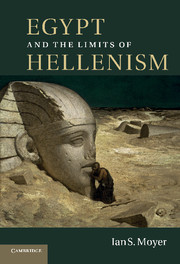Book contents
- Frontmatter
- Contents
- List of figures and table
- Acknowledgments
- Introduction: the absence of Egypt
- 1 Herodotus and an Egyptian mirage
- 2 Luculentissima fragmenta
- 3 The Delian Sarapis aretalogy and the politics of syncretism
- 4 Thessalos and the magic of empire
- Epilogue
- Appendix I Text and translation of the Delian Sarapis aretalogy (IG XI. 1299)
- Appendix II Translation of the Madrid manuscript of Thessalos, De virtutibus herbarum (Codex Matritensis Bibl. Nat. 4631)
- Appendix III Dating the composition of Thessalos, De virtutibus herbarum
- Bibliography
- Index
Epilogue
Published online by Cambridge University Press: 05 July 2011
- Frontmatter
- Contents
- List of figures and table
- Acknowledgments
- Introduction: the absence of Egypt
- 1 Herodotus and an Egyptian mirage
- 2 Luculentissima fragmenta
- 3 The Delian Sarapis aretalogy and the politics of syncretism
- 4 Thessalos and the magic of empire
- Epilogue
- Appendix I Text and translation of the Delian Sarapis aretalogy (IG XI. 1299)
- Appendix II Translation of the Madrid manuscript of Thessalos, De virtutibus herbarum (Codex Matritensis Bibl. Nat. 4631)
- Appendix III Dating the composition of Thessalos, De virtutibus herbarum
- Bibliography
- Index
Summary
When Thessalos wrote of his quest for magical wisdom in Thebes, he gave the impression that he was seeking knowledge from an ancient community that was beginning to fade away. There were wise and learned men there, but only one of them could deliver on his promises of magic. When he found that venerable old priest, he walked with him in deserted parts of the city, and he made his desperate plea for knowledge in a sacred precinct no longer filled with people and the sounds of worship, but gripped by silence. While Thessalos appropriated and supplanted the authoritative voice of Egyptian wisdom, he also evoked the image of a “vanishing Egyptian.” The act of capturing and preserving alien wisdom, as in so many other cases, went hand in hand with a fable of its ever-receding sources. The magic of empire has the power to make people disappear. On the other hand, History, Michel de Certeau has taught, is the attempt to recuperate vanished voices and a vanished past in the form of a text. Thessalos' story reminds us that some of these voices have disappeared and some have been disappeared. If all pasts are absent, some pasts are more absent than others. Their absence is produced in particular texts and in particular contexts, both ancient and modern. And if the past is an “other” country, the Egyptian past has been doubly other, especially when considered together with the Greek past, and through the mediation of Greek texts alone.
- Type
- Chapter
- Information
- Egypt and the Limits of Hellenism , pp. 274 - 281Publisher: Cambridge University PressPrint publication year: 2011

